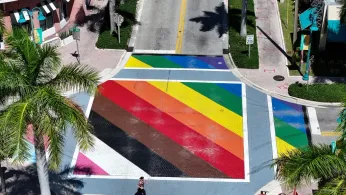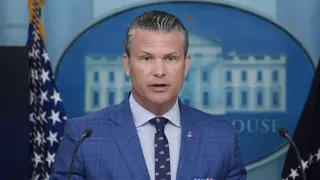
5 hours ago
Delray Beach Defies State Pressure, Keeps Pride Intersection Intact
READ TIME: 3 MIN.
Delray Beach officials announced on August 15, 2025, that the city will keep its prominent Pride-themed intersection in place, resisting demands from Florida state authorities to remove the rainbow mural that has become a local symbol of LGBTQ+ inclusion. This decision comes after weeks of uncertainty, threats of state-level legal and financial repercussions, and vocal input from both supporters and critics of the intersection’s continued existence .
The intersection, located in the heart of the Pineapple Grove Arts District at NE 1st Street and NE 2nd Avenue, has served as a visible affirmation of Delray Beach’s LGBTQ+ community since its installation. In recent months, however, it became the focus of a state campaign targeting street art, with officials citing safety concerns and new legislation restricting non-standard road markings .
The Florida Department of Transportation (FDOT) has issued warnings to several cities with Pride-themed murals, arguing that such designs could pose a distraction to drivers and do not comply with federal and state transportation standards. In July, Delray Beach signaled it would comply and began the process of covering the intersection with black paint, sparking immediate backlash from residents and LGBTQ+ organizations .
Following the initial covering, officials noted the mural’s colors began to reappear as the paint wore off, a visual metaphor for the resilience of the community’s visibility. The city faced mounting pressure from both the state and local activists, with the debate drawing national media attention .
Mayor Tom Carney and Vice Mayor Rob Long emphasized the city’s commitment to representation and inclusion, noting that while Delray Beach strives to meet state and federal guidelines, it also has a responsibility to its residents. "I'm proud to have the intersection representing our community and it lets me know that it's an inclusive city and safe and I feel comfortable," said local business owner Gus Enos .
The city’s decision to maintain the Pride intersection has been widely interpreted as an act of resistance to increasing state-level efforts to curtail LGBTQ+ visibility in public spaces. Florida has recently enacted several laws that critics say disproportionately target LGBTQ+ communities, including heightened restrictions on drag performances and bans on certain forms of gender-affirming care .
For many residents, the intersection is more than just street art—it is a symbol of belonging and recognition. "It sends a message that Delray Beach welcomes everyone, no matter who they love or how they identify," said Maria Ortiz, a local LGBTQ+ advocate. Community groups quickly mobilized to support the city’s decision, organizing rallies and social media campaigns under the hashtag #DelrayPrideStays (Instagram: @DelrayPrideStays).
Not all locals agree, however. Some residents have voiced concerns that the mural prioritizes one group over others, while others argue the intersection should remain neutral or feature broader symbols like the American flag. Still, city leaders have stood by the mural, noting its importance for LGBTQ+ youth and marginalized groups seeking affirmation in public life .
Delray Beach’s decision comes at a time when cities nationwide are grappling with similar controversies. While Florida’s recent legislative actions have emboldened some municipalities to remove LGBTQ+ symbols from public spaces, others—like Delray Beach—are choosing to push back, citing the need for visible support and representation.
Legal experts note that the conflict may not be fully resolved, as state officials could continue to pursue sanctions or legal action against the city . For now, however, the Pride intersection remains, serving as a testament to the power of community advocacy and the ongoing struggle for LGBTQ+ rights in the public sphere.
Residents and visitors alike continue to visit the intersection, with many describing it as a beacon of hope and pride amid challenging times for LGBTQ+ Floridians. As the debate over public symbols of inclusion continues, Delray Beach’s decision is likely to resonate far beyond the city’s borders.






